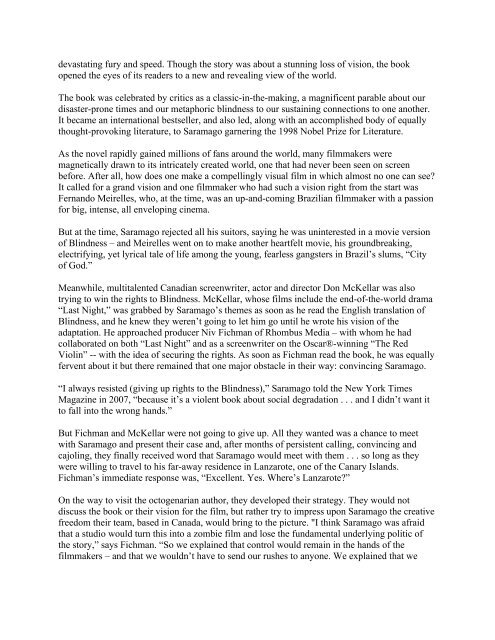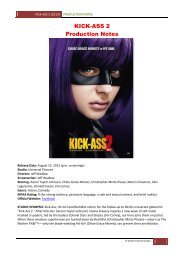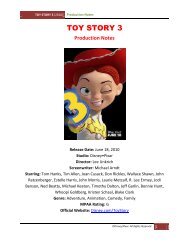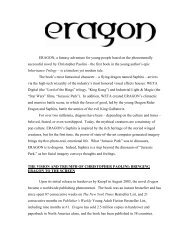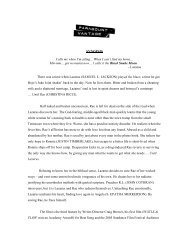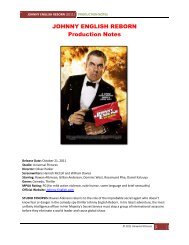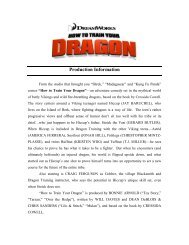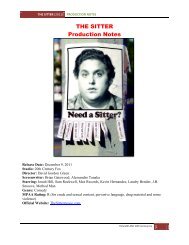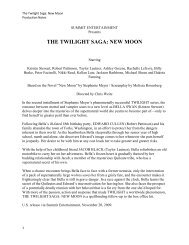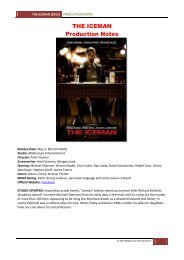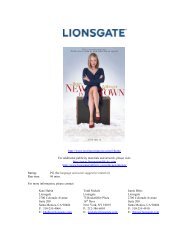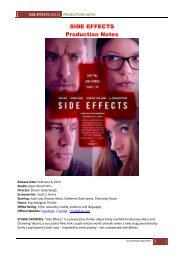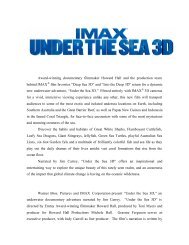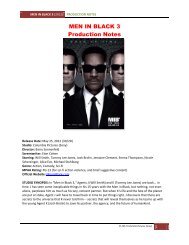You also want an ePaper? Increase the reach of your titles
YUMPU automatically turns print PDFs into web optimized ePapers that Google loves.
devastating fury and speed. Though the story was about a stunning loss of vision, the bookopened the eyes of its readers to a new and revealing view of the world.The book was celebrated by critics as a classic-in-the-making, a magnificent parable about ourdisaster-prone times and our metaphoric blindness to our sustaining connections to one another.It became an international bestseller, and also led, along with an accomplished body of equallythought-provoking literature, to Saramago garnering the 1998 Nobel Prize for Literature.As the novel rapidly gained millions of fans around the world, many filmmakers weremagnetically drawn to its intricately created world, one that had never been seen on screenbefore. After all, how does one make a compellingly visual film in which almost no one can see?It called for a grand vision and one filmmaker who had such a vision right from the start wasFernando Meirelles, who, at the time, was an up-and-coming Brazilian filmmaker with a passionfor big, intense, all enveloping cinema.But at the time, Saramago rejected all his suitors, saying he was uninterested in a movie versionof Blindness – and Meirelles went on to make another heartfelt movie, his groundbreaking,electrifying, yet lyrical tale of life among the young, fearless gangsters in Brazil’s slums, “Cityof God.”Meanwhile, multitalented Canadian screenwriter, actor and director Don McKellar was alsotrying to win the rights to Blindness. McKellar, whose films include the end-of-the-world drama“Last Night,” was grabbed by Saramago’s themes as soon as he read the English translation ofBlindness, and he knew they weren’t going to let him go until he wrote his vision of theadaptation. He approached producer Niv Fichman of Rhombus Media – with whom he hadcollaborated on both “Last Night” and as a screenwriter on the Oscar®-winning “The RedViolin” -- with the idea of securing the rights. As soon as Fichman read the book, he was equallyfervent about it but there remained that one major obstacle in their way: convincing Saramago.“I always resisted (giving up rights to the Blindness),” Saramago told the New York TimesMagazine in 2007, “because it’s a violent book about social degradation . . . and I didn’t want itto fall into the wrong hands.”But Fichman and McKellar were not going to give up. All they wanted was a chance to meetwith Saramago and present their case and, after months of persistent calling, convincing andcajoling, they finally received word that Saramago would meet with them . . . so long as theywere willing to travel to his far-away residence in Lanzarote, one of the Canary Islands.Fichman’s immediate response was, “Excellent. Yes. Where’s Lanzarote?”On the way to visit the octogenarian author, they developed their strategy. They would notdiscuss the book or their vision for the film, but rather try to impress upon Saramago the creativefreedom their team, based in Canada, would bring to the picture. "I think Saramago was afraidthat a studio would turn this into a zombie film and lose the fundamental underlying politic ofthe story,” says Fichman. “So we explained that control would remain in the hands of thefilmmakers – and that we wouldn’t have to send our rushes to anyone. We explained that we


